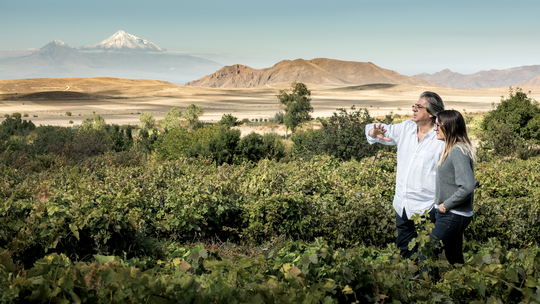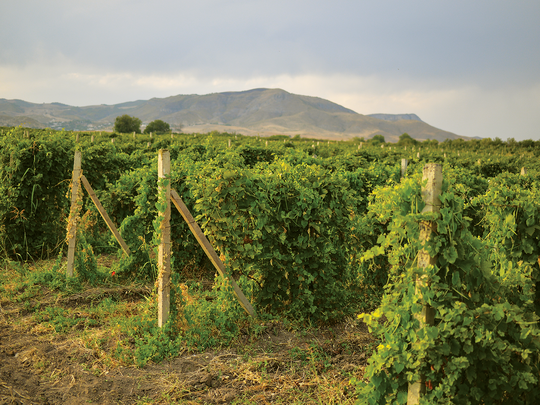With over 50 registered winemakers in Armenia to date, the prospects for a thriving wine industry are clearly on the horizon. But Armenia’s ascendancy to wine royalty will be forever rooted in the vision of the groundbreakers of Armenia’s momentous wine comeback. These bold and daring individuals planted their stake in a nascent industry early, wisely and passionately. Each brought a unique attribute influenced by their backgrounds and experiences in other countries, eventually building an end-to-end wine industry with the capacity to change the fortunes of an entire nation.
After more than a decade since they took a chance on Armenia, the verdict is in—Armenian wines are in a rarified class by themselves, just like these game-changers who saw Armenia’s future through a wine glass half full.
With any seminal discovery of a precious commodity, be it gold in California, diamonds in Africa, oil in the Middle East, or the first high tech company in Silicon Valley, the lore is rife with cautionary tales about how an industry can be a powerhouse for national prosperity or a case study in human and environmental exploitation. Fortunately, each of the winemakers who shared their stories with us agreed that, at the core of the wine business, is a respect for the land and a commitment to follow responsible agricultural practices—always with a mind for generating local jobs and sustaining a growth economy.
The integrity, creativity, and ingenuity of these extraordinary visionaries will serve Armenia well as it completes its transformation into a wine capital of the world.

Visionary: Eduardo Eurnekian
Country of Origin: Argentina
Company: Karas Wines
Location: Armavir, Armenia
Unique Attribute: Brand Visibility
One of the best-known names among Armenian wine labels, Karas Wines was conceived by a name synonymous with nation-building in Armenia—Argentine business magnate Eduardo Eurnekian. His early investments in the infrastructure of the homeland reflect on his instincts for identifying national imperatives with uncanny timing and investing in their successful implementation. “Everything that Eduardo touched, every investment and project he got involved in had one main objective—to create bridges between Armenia and the world,” observed his niece Juliana Del Aguila, to whom Eurnekian fully entrusted the Karas enterprise as its Chief Executive Officer upon purchasing the land in the Armavir region of Armenia.
Eurnekian’s vision to transform Zvartnots International into a world-class airport not only upgraded the country’s first impression on visitors and tourists but also connected Armenia to the outside world during a period of national isolation when fledging independent Armenia, surrounded by hostile enemies on two of its borders, was struggling to survive. With the huge success of the airport, Eurnekian then set his sights on the next big bet on Armenia’s future—its agricultural potentials. He purchased 100 acres of land in Armavir and began planting grapes and other crops as his first order of business.
Today, Karas Wines lays claim to over 500 acres of land and employs over 500 people. Its vineyard grows both indigenous Armenian and foreign grape varieties from Italy and France. “Every grape we grow in Armenia has a distinct character, due to the unique terroir of our vineyards,” explains Del Aguila. “Even the Italian varieties like Montepulciano or Ancellotta taste and feel different in Armenia.”

Now, Karas has ventured into growing organic grapes to meet the rising demand for organic wines in the international market. With a current capacity to produce and bottle over 2,000,000 liters of wine, Karas projects an increase to 3,500,000 liters in the next few years, to be aged in its state-of-the-art local wine cellars. Fully committed to growing Armenia’s economy, Karas chooses to purchase its bottles and labels from Armenia and hire locals to work in their vineyards. Del Aguila acknowledges, “Our project is quite ambitious. We are not only trying to make good wine but also looking to enhance people’s lives.”
Karas Wines has won numerous inter-national awards and is a best seller in Armenia and the Diaspora. The brand is available online from several online wine sellers, as well as in wine shops in Los Angeles, New York, and New Jersey, to name a few. Visitors to Armenia can tour the picturesque Karas vineyards, located in the lush Ararat Valley, a location Eurnekian had chosen intentionally. There is also a tasting room in which visitors can sample the variety of wines under the Karas name—red, white, rosé, and sparkling.

Visionary: Zorik Gharibian
Country of Origin: Italy
Company: Zorah Wines
Location: Vayots Dzor, Armenia
Unique Attribute: Authenticity
Italian-Armenian Zorik Gharibian, the founder of Zorah Wines, has a simple secret to success: to make wines he believes in. His artisanal products reflect his philosophy, as well as the heritage, culture, and land from which they originate. Working exclusively with native Armenian grapes grown in his vineyard in Rind, Gharibian shields his winemaking process from both human and technological intervention as much as possible, employing instead ancient Armenian winemaking methods, which involve aging the wine in clay amphoras. Wine critic Henry Jeffreys of Food and Wine magazine appreciates the approach, writing, “I tried a wine last month that stopped me in my tracks. It was a red, aged in amphorae, traditional clay jars, from Armenia.”
With high marks from wine publications and top mentions on wine lists, the Zorah wines continue to delight the “winerati,” although Gharibian doesn’t seem to be focused on ratings and awards.
“If I am able to inspire the young generation of Armenian winemakers to believe in the potential of the land and create high quality, interesting wines from indigenous grape varieties, following traditional aging methods, Armenia can become a category in itself and I will have succeeded,” says Gharibian. He firmly believes that Armenia should focus on the quality of wines and that more family-owned boutique wineries should be established so that each winemaker can retain the authentic character of its label.
Aspiring to elevate the status of Armenian wines worldwide, Gharibian admits, “In order to achieve recognition, we have to be aware of the fragility of what we have and act responsibly.” He contends that the Armenian government should help ensure that the wine industry is built on a sound foundation with laws and regulations protecting the land and sparing the native grapes from diseases like Phylloxera—a grapevine parasite that can spread quickly due to irresponsible planting. “We risk losing a patrimony of ancient grapes, which are the heritage of our country and the world at large,” says Gharibian. He also advocates for winemaking in Armenia to be treated as a long-term enterprise and the industry should not aim for quick profits. “Wine is a slow process and patience is key,” he adds. Zorah produces two dry reds, Karasì and Yeraz, and one dry white, Voskì.
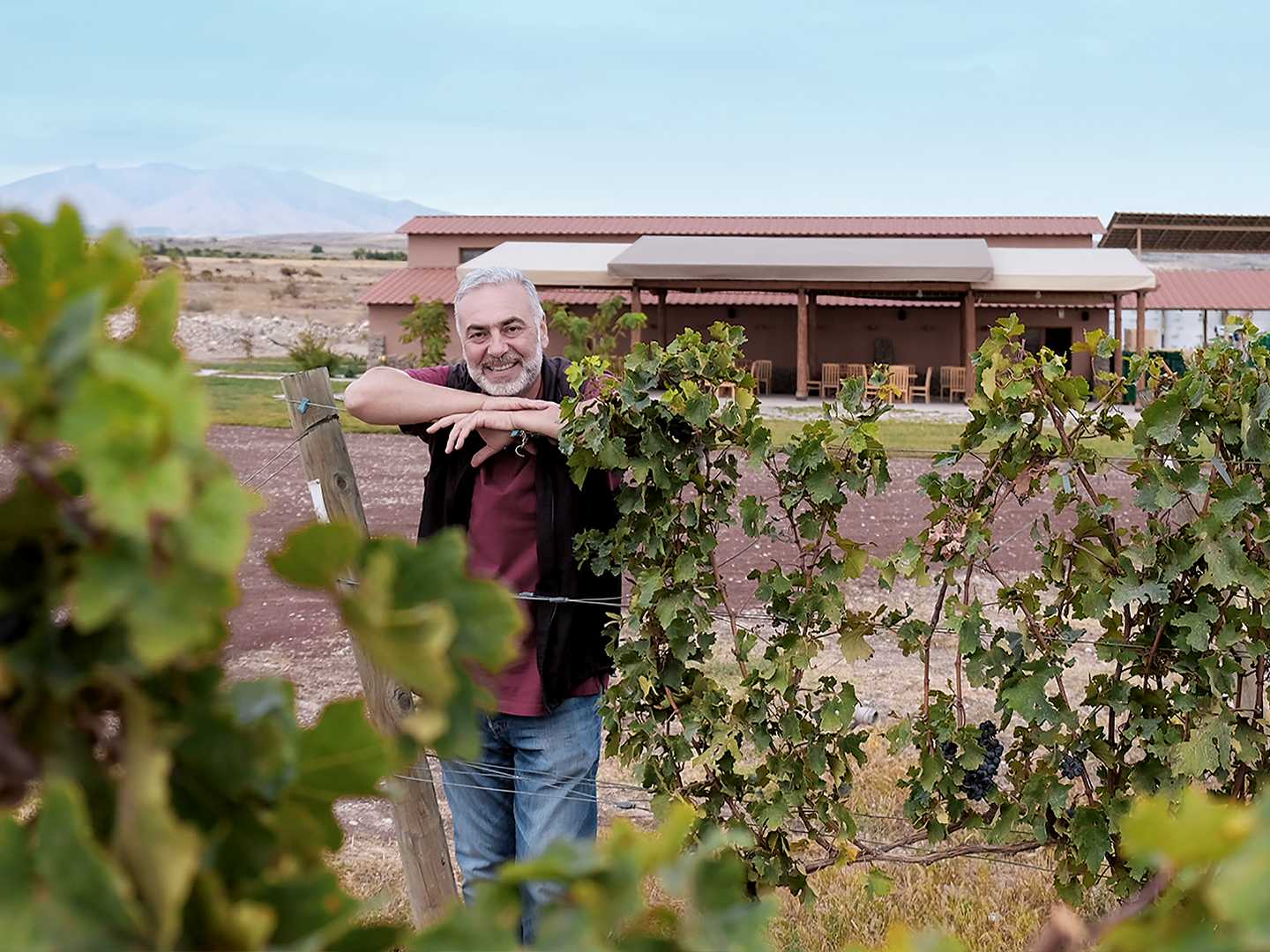
Visionary: Varuzhan Mouradian
Country of Origin: United States
Company: Van Ardi
Location: Aragatsotn, Armenia
Unique Attribute: Prestige
There are many boutique wineries in Armenia and one of them is Varuzhan Mouradian’s Van Ardi, located in the unique terroir of the city of Ashtarak in the Armenian Aragatsotn region—a setting with historic dimensions and an undeniable calling for winemaking since the medieval times. Mouradian repatriated with his family from the U.S. to Armenia in 2008, investing entirely in his vineyards. “Our goal is to raise the profile of Armenia as the source of exceptional and exquisite wines that are of high quality and unique character,” says Mouradian. “We are proud to say that in only five years of production we have achieved this goal, now entering our sixth vintage.” The achievement has not only helped polish the impressive reputation of Armenian wines across international markets but also plays a significant role in the wine renaissance of Armenia.
Van Ardi grows five varietals in its vineyards, four of which are endemic Armenian varieties—Areni, Kakhet, Haghtanak, and Kangun. According to Ani Mouradian, her father was the first to disprove the notion that the Areni grape only grows well in Vayots Dzor, where the Areni village and the site of the world’s first winery are located. “He planted Areni vines in the Aragatsotn region, and it performs fantastically,” she says.
Van Ardi produces red, white and rosé wines and offers tours of the vineyard.

Visionary: Vahe Keushguerian
Country of Origin: Syria/U.S./Italy
Company: Wine Works
Location: Yerevan, Armenia
Unique Attribute: Originality
A Syrian-Armenian who spent parts of his life in Lebanon, the United States, and Italy, before permanently moving to Yerevan with his family, Vahe Keushguerian is the man behind some of the most esteemed and novel wine labels produced in Armenia. Considered by some to be Armenia’s resident “wine guru,” Keushguerian has mastered all phases of the winemaking process, from growing the grapes to producing, bottling, labeling, marketing and distributing products around the world. He even launched a print magazine called Origins, a visual and verbal celebration of Armenian wine and cuisine.
Along with his daughter Aimee Keushguerian, who manages the daily operations while her father travels far and wide promoting Armenian wines, the two are on a quest to put Armenia on the map by putting its wines on the lists of the worlds’ best.
Keushguerian’s journey began as a waiter turned restaurant owner, which morphed into a wine manufacturing operation in Tuscany and Puglia. When he arrived in Armenia, his first pursuit was analyzing the potential of indigenous grapes, mostly by experimentation. The first of these experiments paid off with varieties like Chilar and Tozot. Starting with just a few barrels of untried wines, the results were surprisingly positive.
During this time, renowned winemaker Paul Hobbs, dubbed the Steve Jobs of Wine by Forbes magazine, visited Armenia to pursue a joint venture with partners Viken and Vahe Yacoubian of California. They enlisted Keushguerian to collaborate with them, which resulted in their first batch of Yacoubian-Hobbs wine, created at WineWorks.
Given these early successes and his state-of-the-art facilities, Keushguerian established WineWorks, the first and only wine incubator in Armenia. In just four years, WineWorks’ output grew from 30,000 to 200,000 bottles. It currently incubates 14 labels both from Armenia and Artsakh.
WineWorks has special appeal for investors looking to create their own wine label. Once they purchase the land, plant vineyards or harvest existing grapes, they can bring them to WineWorks. Keushguerian takes it from there, producing, aging and bottling the wine under the family name or custom label. The WineWorks client can then market and distribute the stock independently. These limited signature-projects may be as modest as 10,000 bottles. In that case, the wholesale cost to the owner could be as low as $4 per bottle, which includes everything from grapes to aging and bottling the wine. With an efficiently run distribution, the retail price could command twice or triple the amount, yielding a respectable profit. Alternatively, instead of purchasing land and growing the grapes, an investor can source the grapes directly from a local vineyard and develop the product under the aegis of WineWorks.
Keushguerian sees immense potential in Armenian wine to make the country famous while growing its economy with grapes as a major commodity. “Unlike other agricultural produce, wine is the only commodity that can be transformed into a luxury item. The same grapes can make wine that’s $2 a bottle or $500 a bottle, but it’s always that one kilogram of grapes. We have great tomatoes in Armenia, but no one boasts their tomato juice as the best on any list since nobody really cares. But for the wine they do. Only by serving up the highest quality products can we put Armenian wines in the company of wine nations,” Keushguerian insists.
Some notable labels incubated at WineWorks include Yacoubian-Hobbs, Noa, Keush, Koor, Tus, Sarduri, Seraphim, Oshin, and Z’art, to name a few.
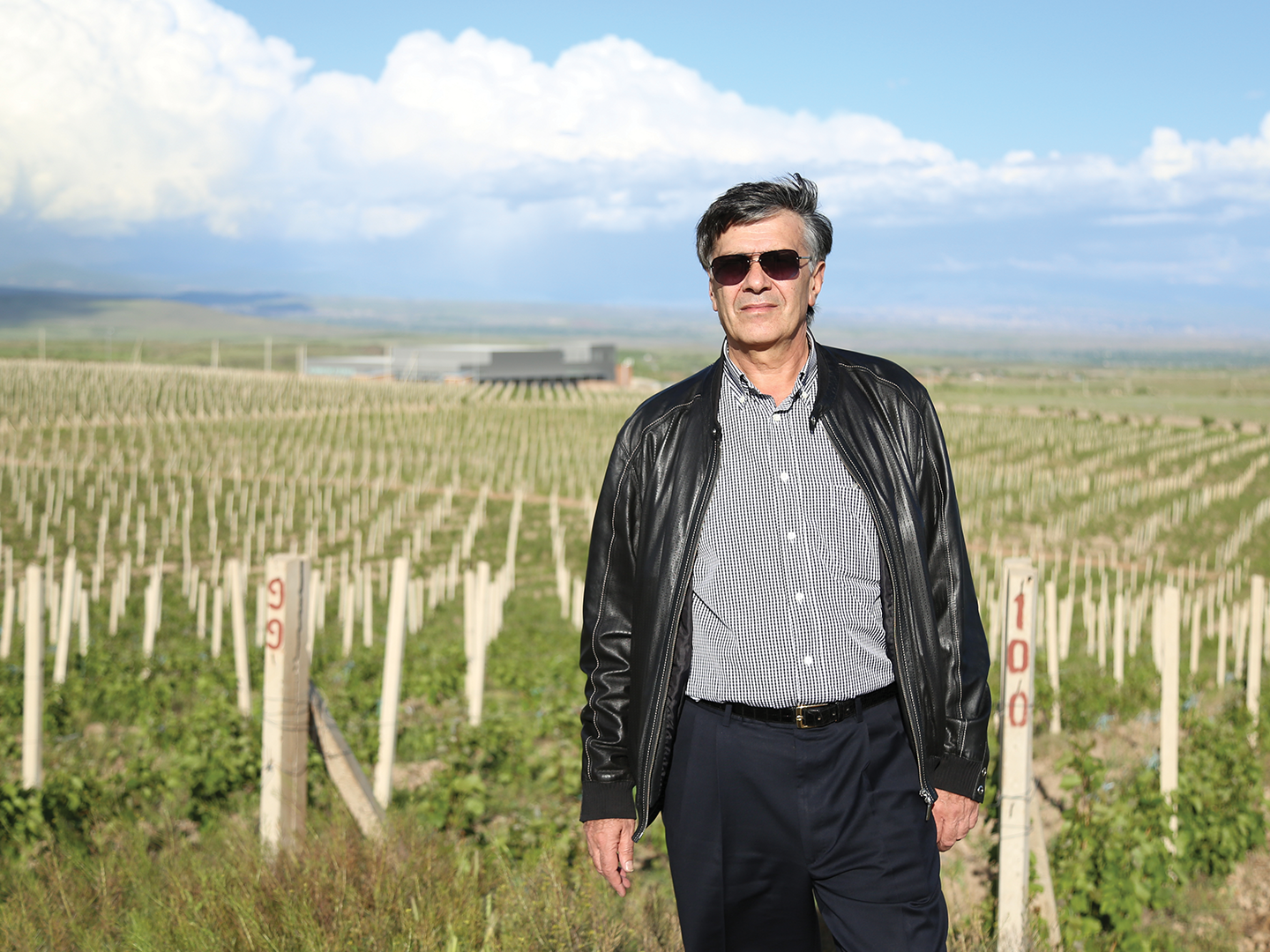
Visionary: Armen Aslanian
Country of Origin: California, U.S.
Company: ArmAs Wine Estate
Location: Aragatsotn, Armenia
Unique Attribute: Immersion
Armen Aslanian repatriated to Armenia from California to establish ArmAs Wine Estate in 2007. Two years later, his daughter Victoria Aslanian joined him to continue advancing the ArmAs Estate brand. Sitting on 180 acres of land in the Aragatsotn region, ArmAs is more than a winery. It also runs a distillery and a dried fruits plant, as well as a boutique hotel and a grand tasting room with family-friendly entertainment. A lake, a farm, and a dormitory that is currently under construction, are also part of the estate.
“ArmAs has many plans for the future, all of which not only intend to grow and expand our “business,” which I prefer to call it our vision but also to develop our country’s wine and tourism sectors and the recognition of our country at large,” explains Victoria Aslanian.
ArmAs also organizes many events, including the Wine and Jazz Festival, Blessing of the Grapes ceremony, Laugh and Wine, Summer Nights, and Harvest and Harmony get togethers where locals and tourists alike are invited to pair wine with delicious food and breathtaking scenery.
ArmAs produces nine award-winning wines using indigenous Armenian grape varietals.
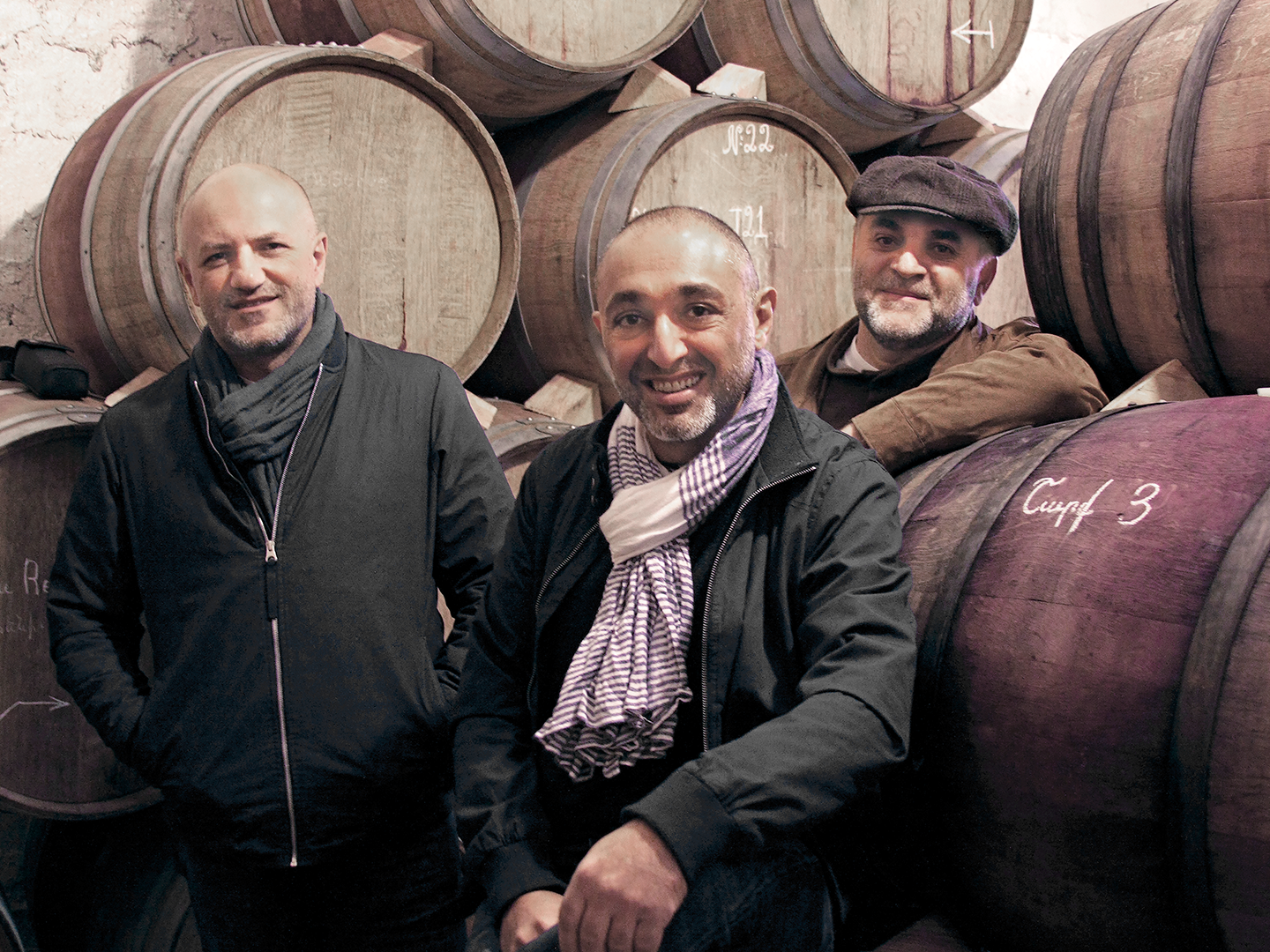
Visionaries: Hovakim Saghatelyan, Vahe Baloulian, and Andranik Grigoryan
Country of Origin: US/Armenia
Company: Trinity Canyon Vineyard
Location: Vayots Dzor, Armenia
Unique Attribute: Organic
Back in 2009, first time restauranteurs Hovakim Saghatelyan and partners Vahe Baloulian and Andranik Grigoryan were searching for superior wines to serve at their newly opened restaurant in Yerevan. Not finding anything that suited their palates or menu, they decided to take matters into their own hands, purchasing a plot of land on which to grow their own vineyard and produce their own brand of wine. Trinity Canyon Vineyard, located in Vayots Dzor, the cradle of Armenian winemaking, is the first and only vineyard in Armenia to produce organic wines. “We are a boutique winery expected to increase production to 35,000 bottles this year, most of which will be sold out before it is released,” says Saghatelyan.
He explained that making organic wine in Armenia is an extremely challenging and expensive endeavor. “Every-thing works against you and unless you have limitless patience and an unwavering dedication to organic principles, it is very tempting to give up and take the easy industrial route.” The trio sells its wines in their wine bar In Vino in Yerevan, as well as their restaurants in Armenia, France and the US. In Vino often organizes tastings for wine enthusiasts to sample Armenian and international wines and learn about the winemaking process.
The Canyon features reds, whites, rosès and sparkling wines under the brand names Trinity Eh, 6100, Areni Ancestors’, JAZZ, and Crossroads.
Banner photo Courtesy of Wine Works by Zenith Photo Studio

